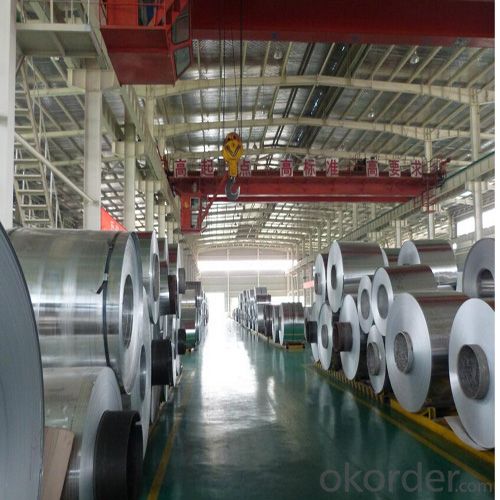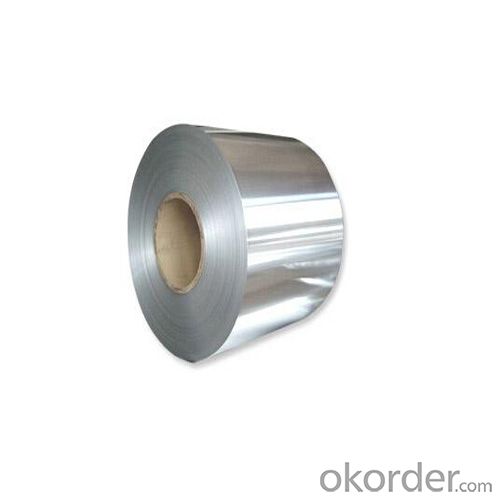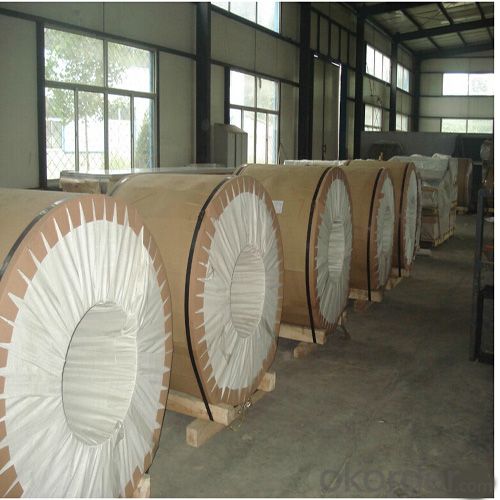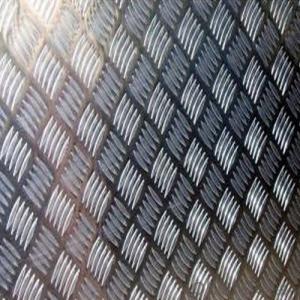One Bar Diamond Aluminum Checker Plate with High Quality
- Loading Port:
- Shanghai
- Payment Terms:
- TT OR LC
- Min Order Qty:
- 5 m.t.
- Supply Capability:
- 10000 m.t./month
OKorder Service Pledge
OKorder Financial Service
You Might Also Like
Item specifice
1.Structure of One Bar Diamond Aluminum Checker Plate Description:
Products commonly used in signs, billboards, building exterior decoration, bus body, high factory wall decoration, kitchen sink, lamp, fan, electronic components, chemical apparatus, sheet processing, deep drawing or spinning hollow ware, welding parts, heat exchangers, Bell surface and plate, plates, kitchen utensils, accessories, safety equipment and other.
2.Main Features of One Bar Diamond Aluminum Checker Plate:
PVC Protect Film
Waterproof paper
High Quality
Competitive Price
3. One Bar Diamond Aluminum Checker Plate Images:



4. One Bar Diamond Aluminum Checker Plate Specification:
Standard | GB/T3190-2008, GB/T3880-2006, ASTM B209, JIS H4000-2006 .etc |
Thickness | 0.2-200mm aluminium 5050 H38 |
Width | 1250mm 1000mm or as your requirements |
Length | 3000mm 5800mm or as your requirements |
MOQ | 5 Ton |
Package | Standard export package, by wooden box or as require |
5.FAQ
Q1.How long have you been in this product?
A1:More than 10 years.
Q2. What's the minium quantity(MOQ)?
A2. 5 Metric tons
Q3. How long is shipping time?
A3. 7 (ready-made products)-25 days(OEM)
Q4. How do you guarantee the quality?
A4. 1. Cooperating and Exchaning experience with sevral quoted aluminum companies
2. Japanese and Swiss production line and skilled works (regular training and testing)
3. more than 10 years production experience.
Q5. Do you have after sale service?
A5. Yes. Any quality problem occurs within one year, pls take photoes,we will be responsible.
- Q:What are the common surface defects found in aluminum coils?
- Common surface defects found in aluminum coils include scratches, pits, dents, stains, oil spots, and surface roughness. These defects can occur during the manufacturing process or due to external factors like handling and transportation.
- Q:What are the different coil slitting methods for aluminum coils?
- There are several coil slitting methods for aluminum coils, including rotary shear slitting, loop slitting, and double knife slitting. Each method offers its own advantages and is suitable for different applications.
- Q:Can aluminum coils be used for food processing equipment?
- Yes, aluminum coils can be used for food processing equipment. Aluminum is a common choice for food processing equipment due to its excellent thermal conductivity, corrosion resistance, and lightweight nature. It is widely used in the food industry for various applications such as heat exchangers, evaporators, and condensers. Aluminum coils are specifically designed to efficiently transfer heat and maintain a stable temperature, making them suitable for food processing equipment that requires precise temperature control. Additionally, aluminum is a non-toxic material, ensuring that it does not contaminate the food being processed. Therefore, aluminum coils are a reliable and safe choice for food processing equipment.
- Q:What are the different coil uncoiling options for aluminum coils?
- There are several coil uncoiling options for aluminum coils, including manual uncoiling, mechanical uncoiling, and motorized uncoiling. Manual uncoiling involves manually unwinding the coil by hand, while mechanical uncoiling utilizes a mechanical device such as a uncoiler or decoiler to unwind the coil. Motorized uncoiling, on the other hand, involves using a motorized system to unwind and feed the coil. Each option has its own benefits and is chosen based on the specific requirements and volume of the aluminum coil being processed.
- Q:What are the different thickness options for aluminum coils?
- Various industrial and commercial applications can be catered to with a wide range of thickness options for aluminum coils. The thickness of these coils is typically measured in gauge or millimeters (mm). Aluminum coils are available in different thickness options: 1. Thin Gauge: Coils with a thin gauge usually have a thickness ranging from 0.15 mm to 0.4 mm. These coils are commonly utilized in applications that necessitate lightweight and flexible materials, such as packaging, electrical wiring, and insulation. 2. Standard Gauge: Coils with a standard gauge have thicknesses ranging from 0.4 mm to 2.5 mm. They find widespread use in industries like construction, automotive, and aerospace for applications like roofing, cladding, heat exchangers, and structural components. 3. Thick Gauge: Coils with a thick gauge typically have a thickness above 2.5 mm. These coils are predominantly employed in heavy-duty applications that require high strength, durability, and load-bearing capacity. Examples include shipbuilding, industrial machinery, and large-scale structural frameworks. It is important to note that the availability of specific thickness options may vary depending on the manufacturer and the intended application. Additionally, custom thicknesses can be manufactured to meet specific project requirements.
- Q:Are aluminum coils suitable for low-maintenance roofing applications?
- Indeed, low-maintenance roofing applications can benefit from the suitability of aluminum coils. Renowned for its durability, longevity, and corrosion resistance, aluminum proves to be an ideal roofing material. Despite its lightweight nature, aluminum coils possess remarkable strength that ensures superior structural integrity, enabling them to endure diverse weather conditions. Moreover, aluminum's low-maintenance characteristics make it a standout choice. It does not rust and does not necessitate regular painting, allowing homeowners and building managers to save valuable time and money that would otherwise be spent on maintenance tasks such as repainting or replacing rusted components. Ultimately, aluminum coils serve as an outstanding option for low-maintenance roofing applications.
- Q:Im trying to make a aluminum ring. I want it to be rock hard. PLZZAnswers that work get best answer
- Dont use foil from the kitchen. Pure and simple. Get someone to machine you a piece of solid aluminum. You can't change the metallurgical properties of metal.
- Q:having trouble looking for tis information, don't know where to look.Is aluminum accessible to everyone?? Does it cost a lot, is it in minimal areas if so is it hard to transport to all around the world??
- I can't understand you question.do you mean how aluminum works?
- Q:Can aluminum coils be used in the production of aluminum sunshades?
- Yes, aluminum coils can be used in the production of aluminum sunshades. Aluminum coils are typically used as a starting material in the manufacturing process of aluminum sunshades. These coils are made from high-quality aluminum, which is known for its lightweight and durable properties. The coils are then fabricated and shaped into the desired form for the sunshade, whether it be slats, louvers, or a solid panel. Aluminum is a popular choice for sunshades due to its corrosion resistance and ability to withstand various weather conditions. Additionally, aluminum is easily recyclable, making it an environmentally friendly material for sunshade production. Overall, aluminum coils are an essential component in the production of aluminum sunshades, providing strength, durability, and aesthetic appeal to these shading structures.
- Q:What are the common joining techniques used for aluminum coils?
- The common joining techniques used for aluminum coils include welding, soldering, and adhesive bonding.
1. Manufacturer Overview |
|
|---|---|
| Location | |
| Year Established | |
| Annual Output Value | |
| Main Markets | |
| Company Certifications | |
2. Manufacturer Certificates |
|
|---|---|
| a) Certification Name | |
| Range | |
| Reference | |
| Validity Period | |
3. Manufacturer Capability |
|
|---|---|
| a)Trade Capacity | |
| Nearest Port | |
| Export Percentage | |
| No.of Employees in Trade Department | |
| Language Spoken: | |
| b)Factory Information | |
| Factory Size: | |
| No. of Production Lines | |
| Contract Manufacturing | |
| Product Price Range | |
Send your message to us
One Bar Diamond Aluminum Checker Plate with High Quality
- Loading Port:
- Shanghai
- Payment Terms:
- TT OR LC
- Min Order Qty:
- 5 m.t.
- Supply Capability:
- 10000 m.t./month
OKorder Service Pledge
OKorder Financial Service
Similar products
New products
Hot products
Hot Searches
Related keywords






























